About this course
The course is divided into four main modules: 1)Basics and principles: Operation modes in membrane operations. Membrane modules. Membrane materials. Mathematical models for porous and nonporous membranes. Concentration polarization and fouling. Models to describe fouling. Technical evaluation of different membrane processes compared to traditional separation processes. Main applications of membrane technology. 2)Liquid operations: Reverse osmosis, nanofiltration, ultrafiltration and microfiltration. Application of the basic principles to liquid operations. 3)Gas and special operations: Gas separation, pervaporation, membrane contactors, membrane distillation, electrodialysis, membrane bioreactors. 4)Particular applications of membrane technology: Membranes in biotechnology, membranes in the chemical industry, membranes in the food industry, membranes used as reactors, membranes in wastewater treatment.
Learning outcomes
At the end of the course the learner will be able to: , Identify and describe the main unit operations associated with membrane technology , Describe the main industrial applications of membrane technology , Derive equations for solvent and solute transport in pressure driven membrane processes , Calculate how concentration and eventually temperature polarisation influence the solute transport for the different membrane processes , Describe the main polymeric materials used for membrane synthesis , Describe the function of the main used membrane modules and how they are used in different membrane processes , Calculate mean flux; selectivity and membrane area for the different membrane processes , Describe process layout and eventually pre- and post treatment in relation to the fouling problems for the different membrane processes , Employ membrane technology knowledge to discuss recent journal articles in the membrane field and compare the with similar separation processes , Describe current applications of membrane technology with particular emphasis on green processes and sustainability by including several examples of processes in which membrane technology contributes to make processes greener e.g. use in downstream processing or use of membrane enzyme reactors.
Enrolment details
As the course is online, the students must have a proper computer. Cam is also mandatory.
Examination
Report. A set of exercises, which are part of the report, will be given to the students to complete at home during the date of the official exam of the course.
Course requirements
Previous courses covering mass balances and stoichiometric calculations
Resources
- Scientific papers will be used as course material. The papers will be provided by the teacher.
Activities
Lectures and problem solving in groups.
Additional information
- Institution locationAnker Engelunds Vej 1, Online
- More infoCoursepage on website of Technical University of Denmark
- Contact a coordinator
- CreditsECTS 5
- LevelMaster
- Contact hours per week4
- InstructorsManuel Pinelo
- Mode of instructionHybrid
